You Read It First In Vintage Paparazzi
INTIMATELY YOURS: Eyes bulged on the Twentieth Century-Fox lot at the sight of Linda Christian, wearing the wedding dress in which she married Tyrone Power in Rome, walking arm-in-arm with Ty in his groom outfit into the portrait gallery. It seems Linda wanted a good wedding picture before she had her wedding dress remodeled into an evening gown.
Behind the magnificent request of Barbara Hale that she be given no more publicity for awhile lurks a wife’s un-selfish desire to let nothing disturb her happy marriage to Bill Williams. They were about even in popularity when they married but Barbara’s excellent performance as Jolson’s young wife in “Jolson Sings Again” shot her ahead of Bill in publicity, for the time being. And until Bill catches up, Barbara is taking no chances of his feeling slighted; a feeling that can lead to disaster in marriage.

Here and There: Hedy Lamarr will move her children to a new home in Connecticut and make the East her headquarters between pictures, she tells Cal. In Hollywood, Hedy traipses about in peasant skirts and old polo coats. In New York, she is a doll on wheels with beaus galore. So goodbye, Hollywood, Delilah is New York bound . . . Samson (Vic Mature) is toeing the mark, obeying his wife’s commands that he spend less time with cronies and more time with her, or else. Seems as if Mrs. Mature is the second woman to cut Vic’s hair short—and to good advantage . . . A letter from Errol Flynn, deep in the heart of India for the film “Kim,” encloses a picture of Errol with a Van Dyke beard and a brunette beauty on his arm, naturally. If the illness of her beloved grandmother permits, Irene, Princess Ghika, will return to Hollywood with Flynn, so he writes.
Family Affair: Burt Lancaster will undoubtedly jar British reserve when he arrives in London to make that Hal Wallis movie. Burt plans to give them a glimpse of real American entertainment by putting on his circus act. Burt claims he’s probably the only actor to honeymoon in Europe with his wife and two small children. The Lancasters never had the time or money for a honeymoon until now.

Girls and Their Men: It’s the man who colors a girl’s personality. Seeing Jane Wyman in a snappy bathing suit tearing along Santa Monica Beach with Clark Hardwicke, a crack golfer and man-about-town, brought this fact to mind. Janie’s hair blew about her pixie face as she and Clark laughed like carefree kids. The very next night, Cal spotted Jane at a preview dressed in a severe tailored suit with her soft curls combed primly back, the picture of serious dignity. The man with her? The non-social, serious-minded Lew Ayres Ginger Rogers has undergone a complete metamorphosis since falling in love with Greg Bautzer. People are amazed to find a smiling, pleasant Ginger at cocktail parties and premieres. Gone is the rather gloomy-minded Ginger who lived so much to herself. On a trip to New York, Ginger tore down to Ceil Chapman’s and bought dozens of beautiful gowns. She wears them, too, minus the numerous accessories that once gave her a cluttered appearance. Now the love in Ginger’s eyes is about the only trimming she wears.
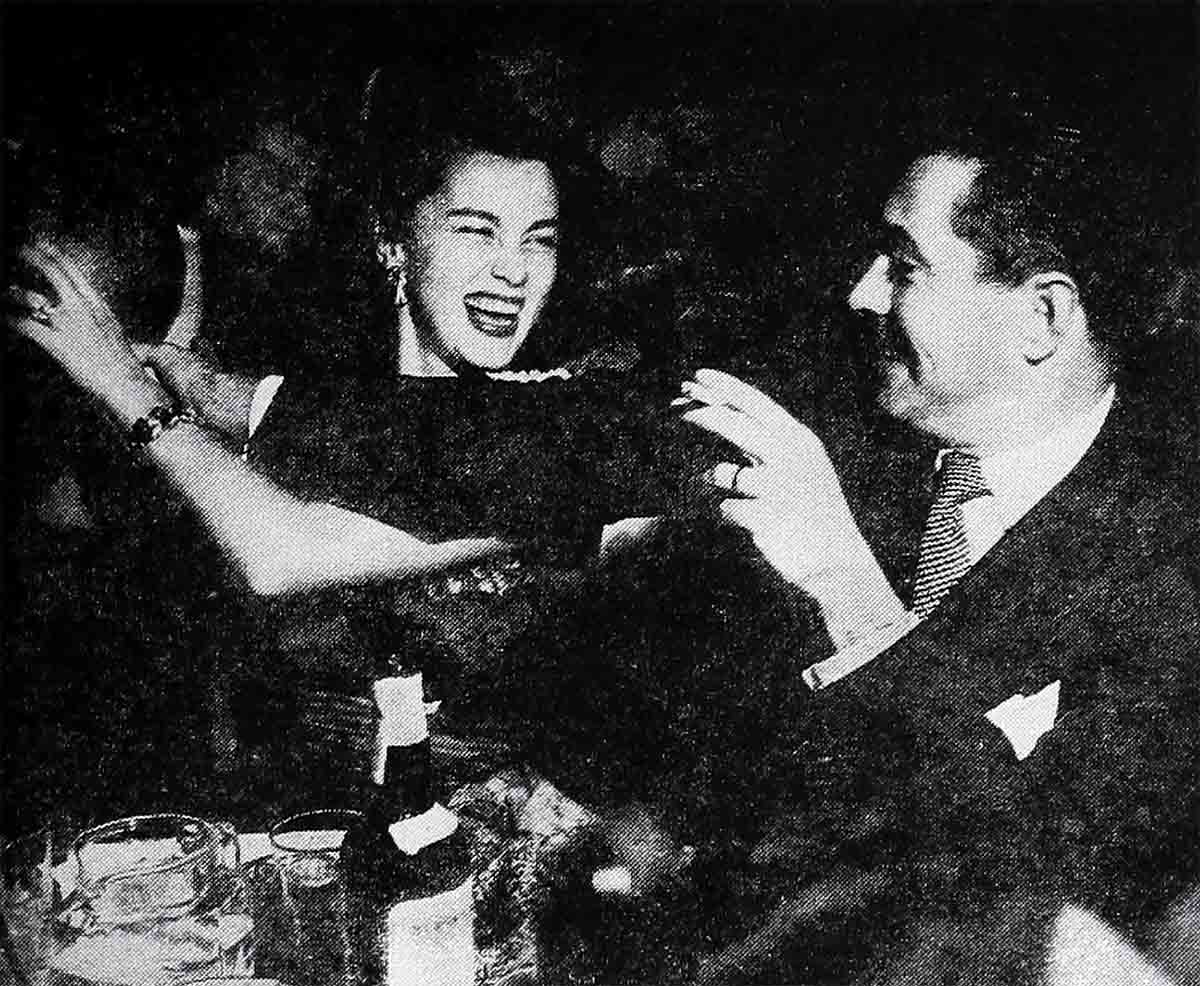
Gregory’s Mustache: A secretary on the Twentieth Century-Fox lot emerged from a private studio showing of “Gun Fighters” with eyes of telltale red. “Whatcha crying about?” a writer asked her, “it’s not that sad.”
“I’m not crying about the picture,” she snorted angrily. “I’m so mad about that awful handle-bar mustache they put on Gregory Peck, I could, well I could cry. He was so handsome in ‘Twelve O’Clock High,’ and now look what they’ve done to him. It’s treason against womanhood, that’s what it is.”
Now the studio is worried lest this be the reaction of fans all over the country. It’s too late to eliminate that rather outsized hirsute adornment but they hope | fans will realize the handle-bar was indicative of that era and overlook it all. Maybe. Personally, Cal doubts it.

Where Was Monty? The rumor that Monty Clift would attend the “Battleground” premiere, brought out the fans in droves to the Hollywood theater. Star after star passed by with fans cheering them on while restlessly they awaited Mr. Clift, who failed to appear.
But all unknown to the legion of fans crowded about the theater, Monty in his usual sloppy attire was strolling quietly down a side street not a half a block from the gay premiere. Under one arm were newspapers, picked up at the corner stand, and on the other arm was his petite brunette secretary.
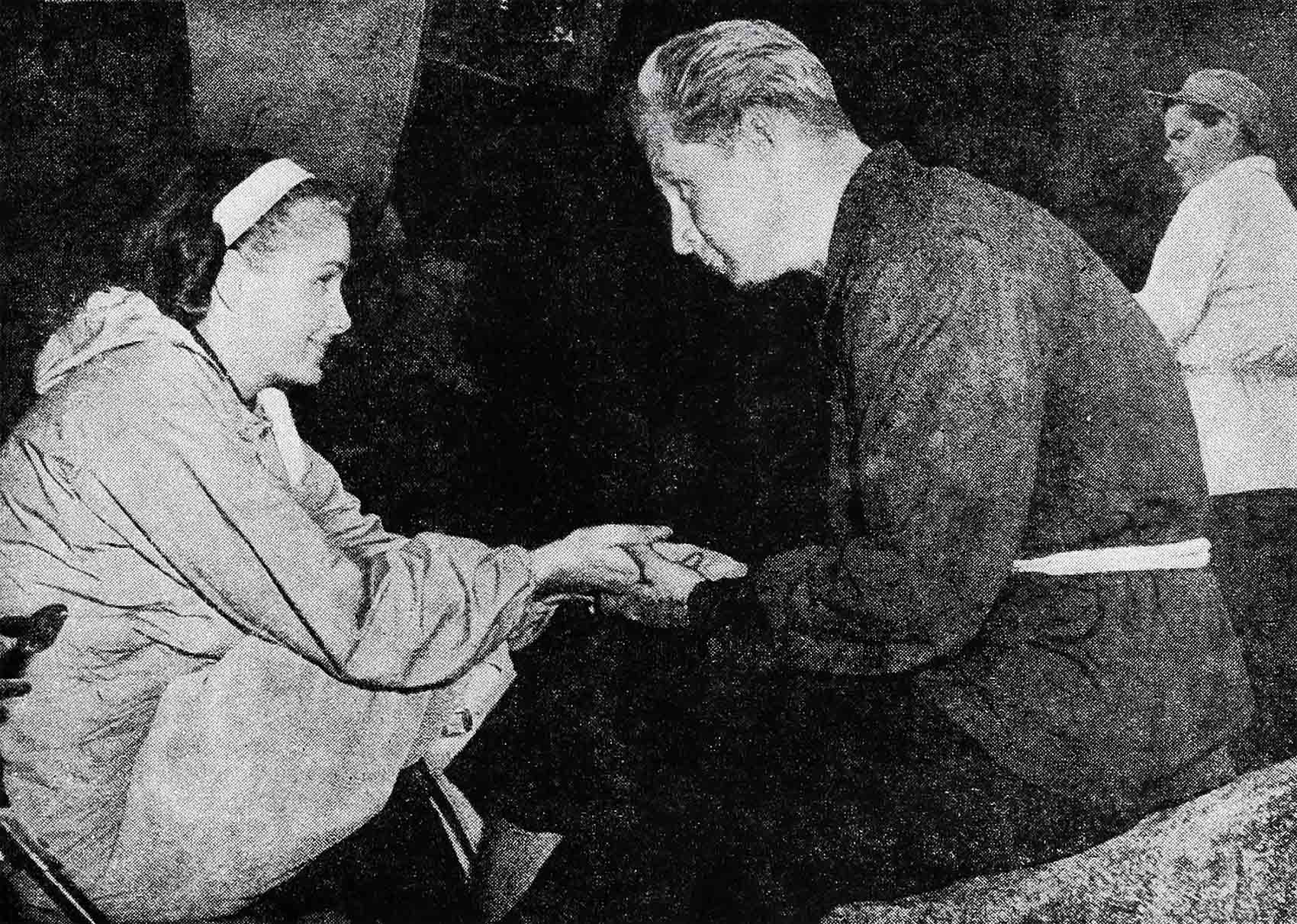
They strolled leisurely, chatting earnestly, when suddenly they became aware that a fan or two and a photographer, who had evidently left the premiere, had spotted them. Like a pair of gazelles they were off, recklessly climbing over car bumpers to get into their own car and dash away.
The fans looked after them disconsolately until one teen-age miss spoke up. “You know, I don’t blame them,” she said. “If those other hundreds of fans had joined us, gee, he might have been killed in the crush.”
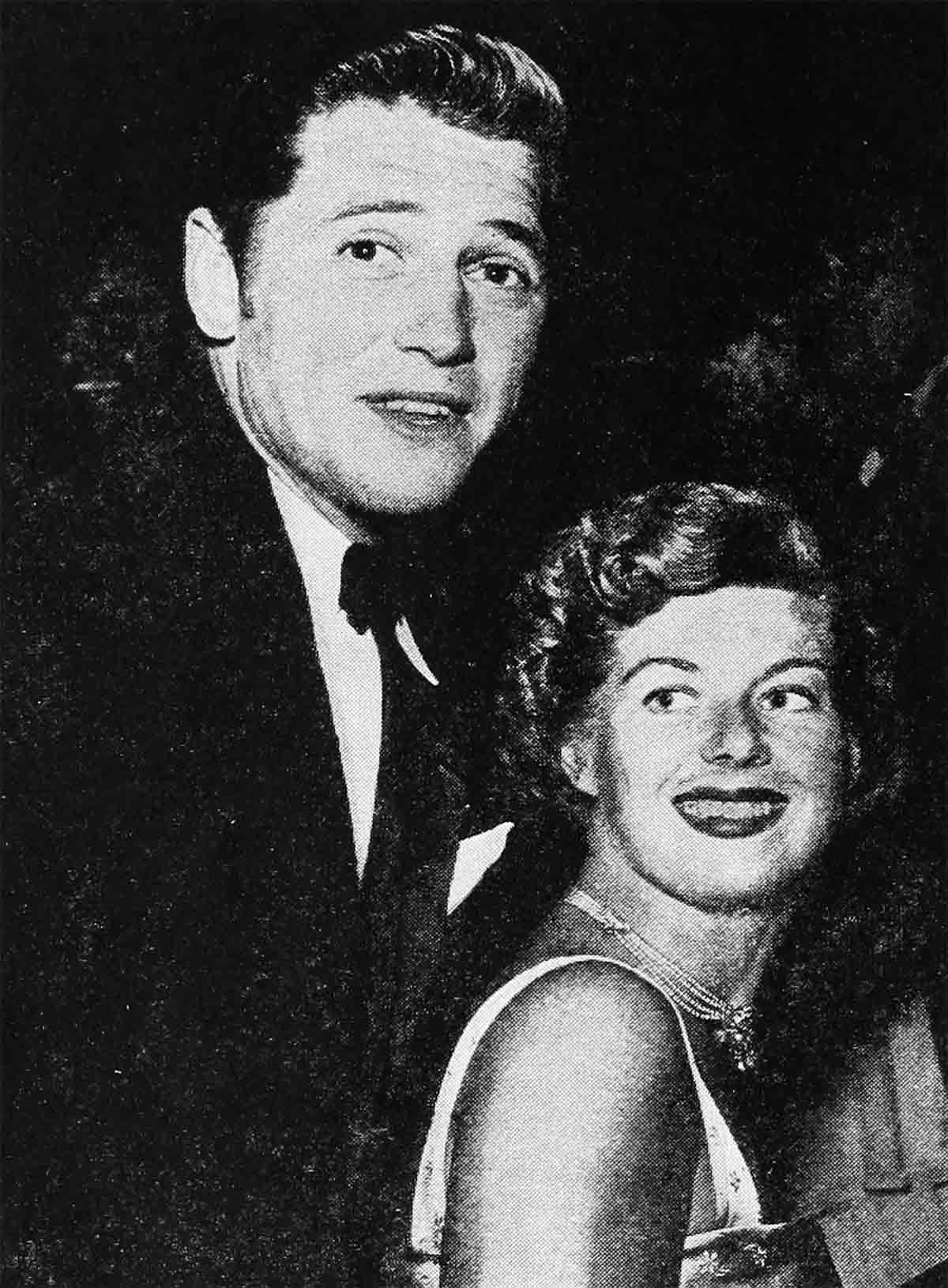
The Oatmeal Kid: In answer to the many fans who have written in concerning the whereabouts of little Roddy McCaskill, the youngster crowned by an oatmeal bowl in “Sitting Pretty,” Cal is happy to say he’s very much around. In fact he’s playing one of the younger children in “Cheaper by the Dozen” with Clifton Webb, no less, playing his father.
Between scenes one day, Jeanne Crain who plays his older sister, and Clifton, were chatting with Roddy who is now going on five. Jeanne asked Roddy if he had any brothers. Roddy said, “yes, he had four.”
“And what are their names?” Jeanne asked.
“Earl,” said Roddy.
When Jeanne explained that was only one and not four, Roddy said, ‘Well, Earl’s my brother and I’m his brother and we’re both brothers and that makes four brothers.” Clifton regarded him curiously for a moment. “That’s the last time I ever crown a growing child with an oatmeal bowl,” he observed and strolled off.
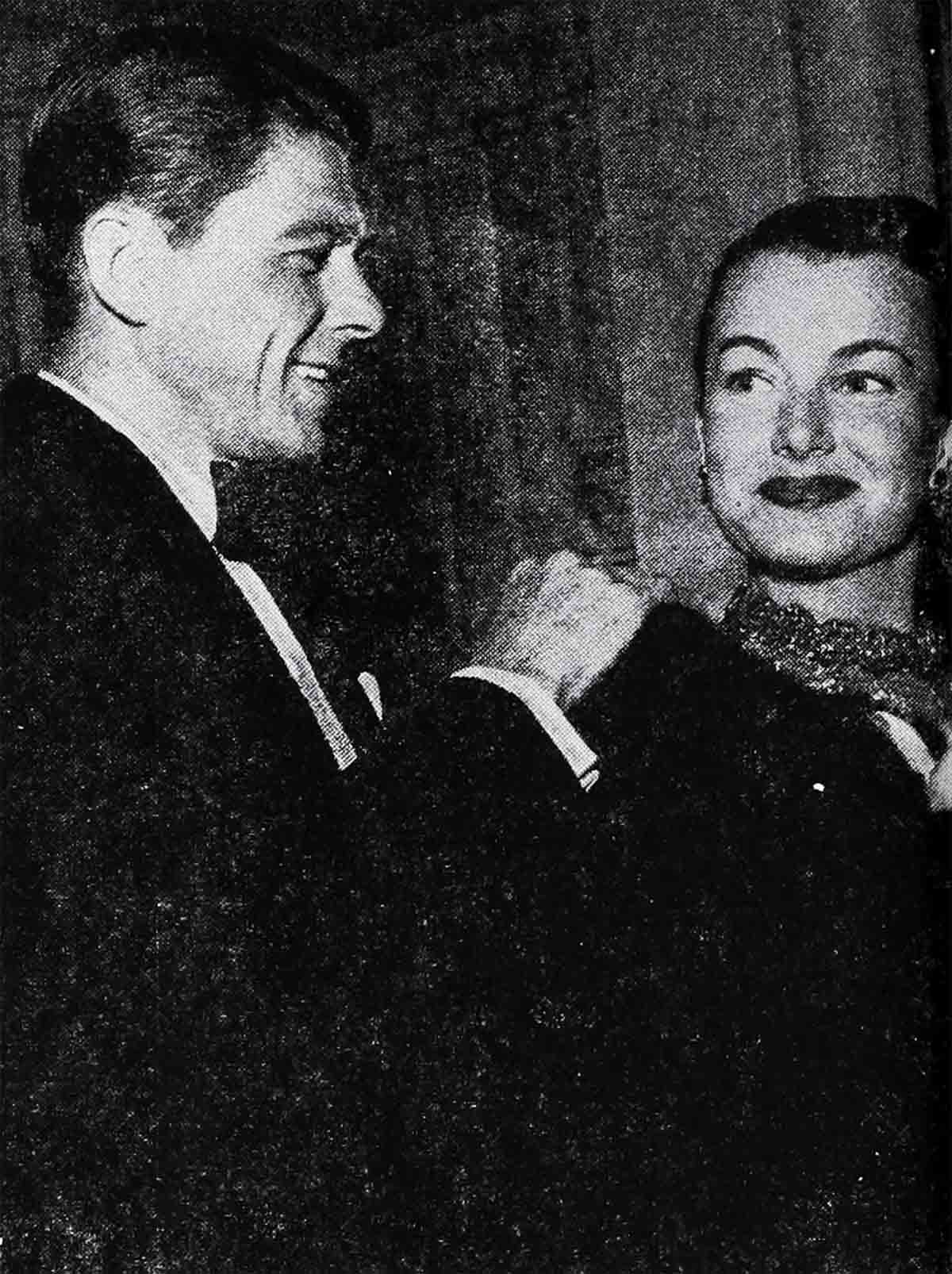
Kidder: That gleam in Johnny Sands’s eye, foretelling a certain prankishness, could have been a factor in his selection by fans as a favorite newcomer.
For instance, a Photoplay editor telephoned General Service studios for a certain picture of Wanda Hendrix; Wanda being quite the chic miss with the new short hair-do she got when she reconciled with husband Audie Murphy.
“Johnny Sands is on this lot, too,” the male voice answered, “why not use him in your article?”
The writer explained it was a beauty column in which Mr. Sands had no place.
“You could make a place,” the voice insisted. “Why not something about the New Johnny Sands Look or How Johnny Sands Keeps Young and . . . ?”
“Now, see here,” interrupted the writer, when over the ’phone came a great shout of laughter. It was Johnny himself, of course, who isn’t above ribbing an editor.

Learning to Play: A middle-aged business man from Chicago who was tired in mind and body and weary of the monotony of his job decided to chuck it all and head, for Hollywood. He was going to learn how to have fun from those playboys and playgirls he’d read about. So, a short time later, with wife and luggage in his car, he leisurely drove west.
After a week of sight-seeing, the wife decided she needed lighter clothing. Stopping in a small Valley shop with an attractive window display, they were both struck by the beauty of their efficient saleslady. “Really, you look so much like Maureen O’Hara of the movies,” the woman observed. “It’s amazing.”
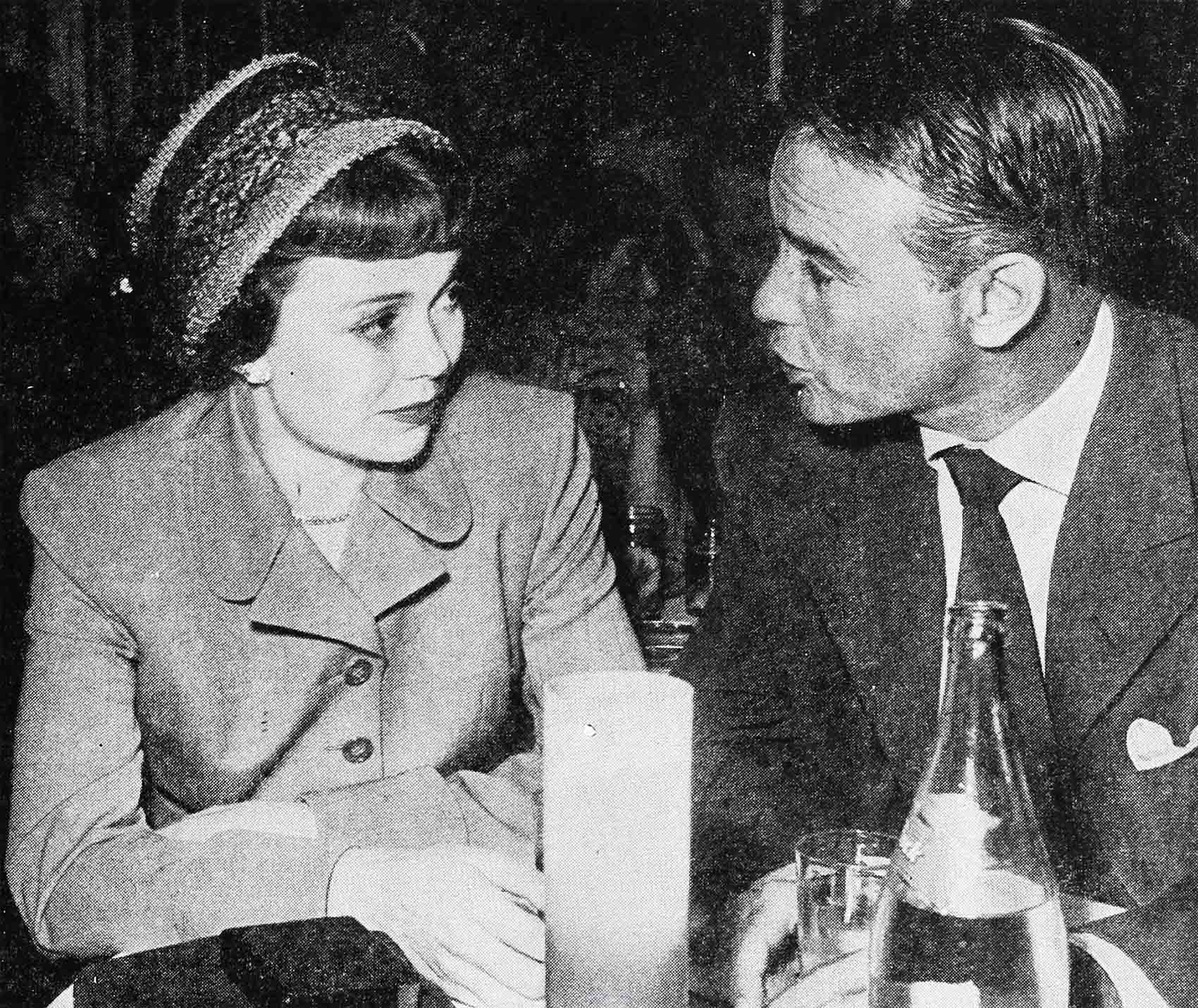
“No, not really,” the saleslady smiled. “I am Maureen O’Hara. You see, I own this shop with a friend and every moment I’m not working at the studio, I come out here to sell.”
They were still discussing the oddity of a movie star working in her free time, several days later, when they drove into a gas station to be greeted by a familiar smiling face. “No, I’m not from Chicago,” the smiling face said, in answer to his customer’s query, “but maybe you’ve seen me in pictures. The name’s James Craig. I own this gas station and I kind of like to oversee thing’s here when I’m not working at the studio.”
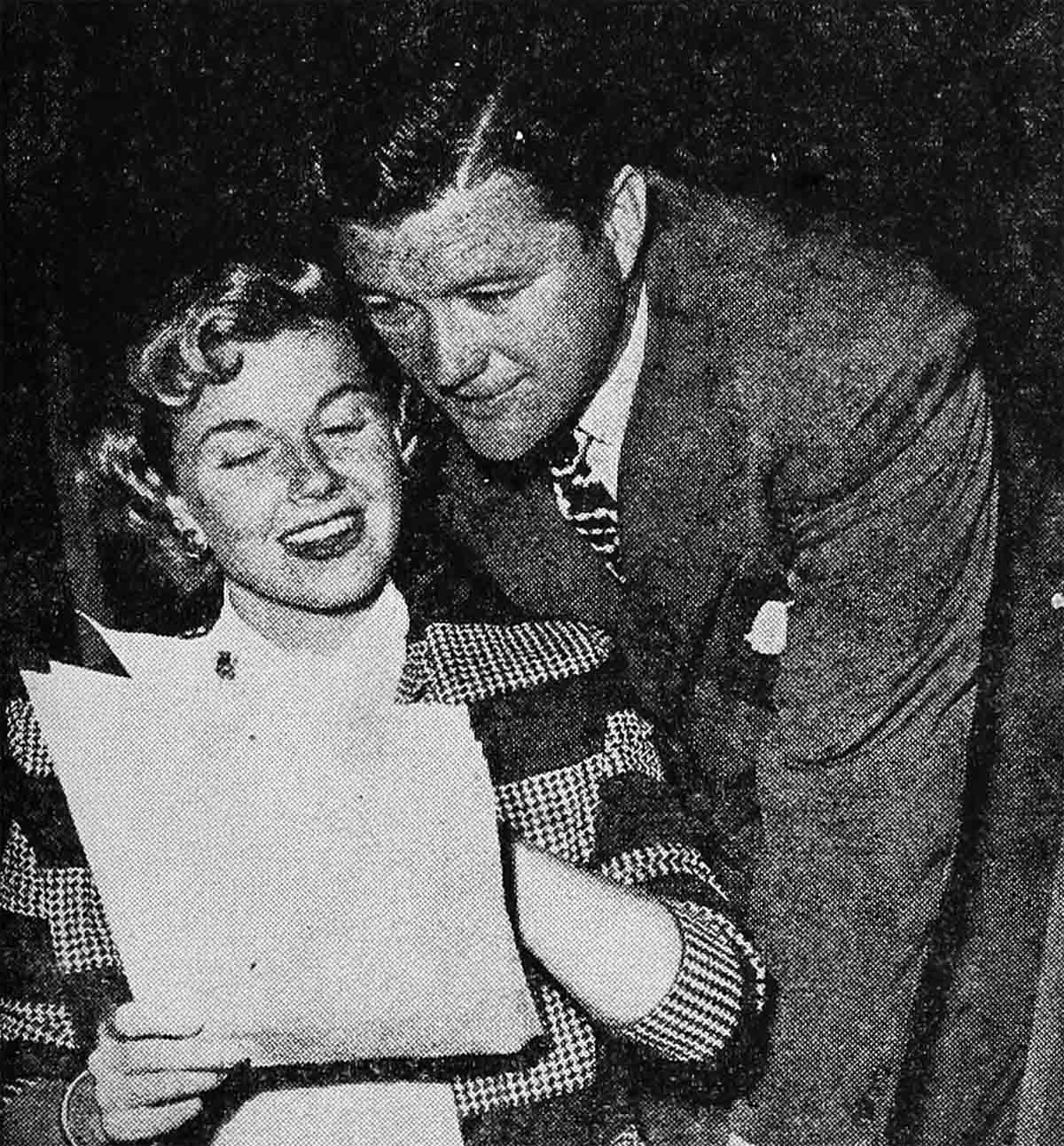
They didn’t need to be told who the couple was behind the counter of a restaurant they visited a few evenings later. They didn’t even inquire if Esther Williams and husband Ben Gage owned the eating place. By this time, they took it for granted.
But it wasn’t until they watched Lionel Barrymore at work on an M-G-M movie set that the full import of Hollywood at play struck the retired business man. In his seventies, painfully handicapped with arthritis, Mr. Barrymore patiently did the scene over and over. “He must leave soon for the broadcasting station,” they were told. “Mr. Barrymore has a ‘Dr. Kildaire’ broadcast this evening. He has three other broadcasts of his own each week, too.”
The would-be playboy headed for home the following week. “All my life I’ve wanted to own a little camera shop,” he confessed to his wife, “now I’m going to do it. I can see to things in the evenings after my regular job.”
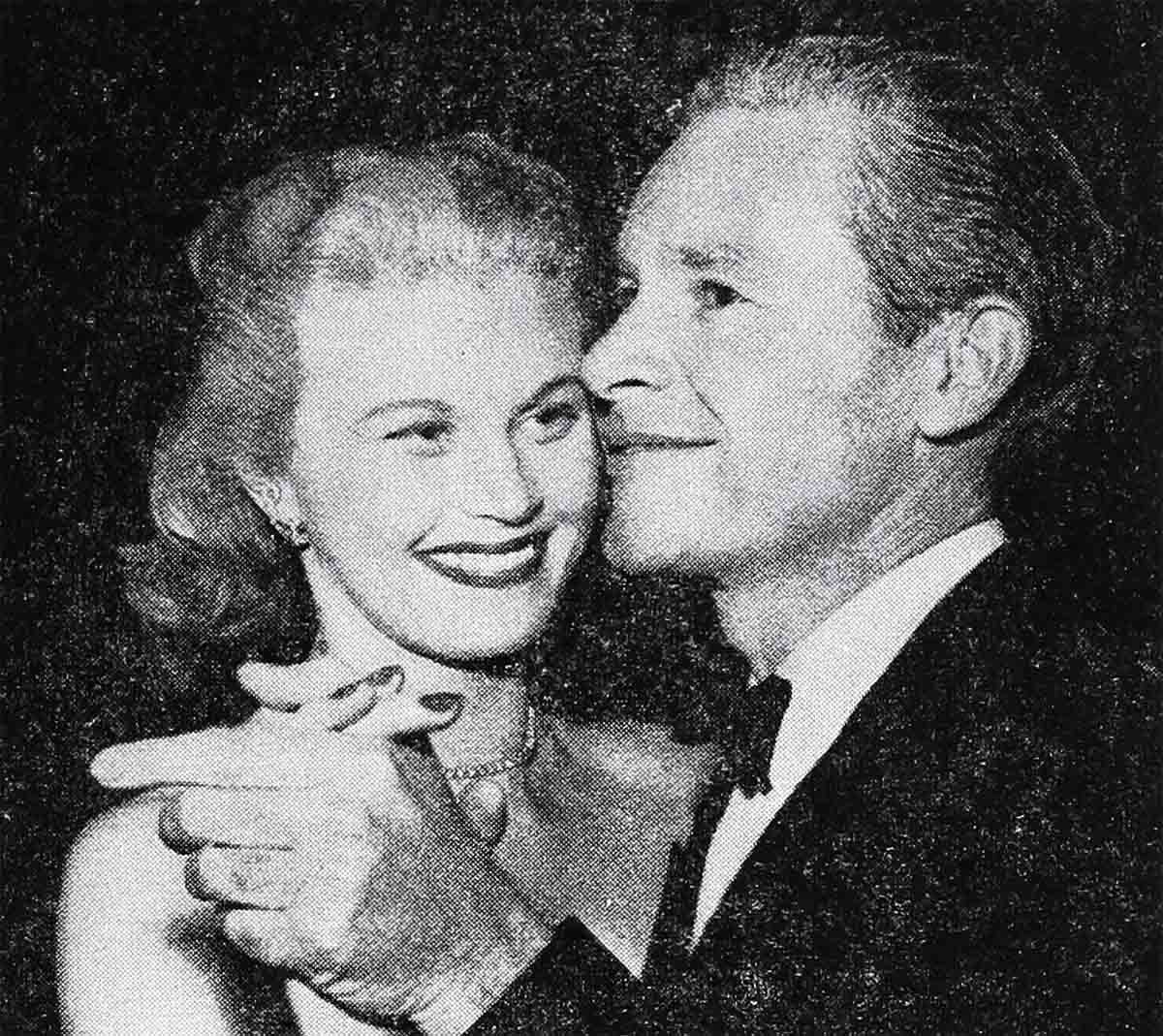
Friendship: When Johnny Scott, who plays piano at those weekly jam sessions held in Dan Dailey’s sound-proof playroom, wrote the tune, “Maybe It’s Because,” Dan heckled every band leader he knew into playing the tune at least once. Apparently, once was enough, for Johnny’s song proved a hit, thanks to Dan, and the lad is on his way.
Mark Stevens felt he couldn’t get along without his stand-in Fred Fisher, for Fred was more than a stand-in. He was Mark’s own private wailing wall and father confessor. Yet, when Fred yearned for an acting career, Mark did everything to help. To the cast of his first picture “No Way Out,” Fred’s first film, he proudly displays the wrist watch, a gift from Mark, engraved “To Dad.”
Even bosses and heads of studios extend a hand of friendship. At least, Darryl Zanuck did when his competent office boy, Lee MacGregor, confessed he wanted to be an actor more than anything in the world. Mr. Zanuck arranged for a test which Lee passed with flying colors and after several minor bits, Mr. Zanuck gave his former office boy a break. You’ll see Lee as the sensitive young officer in “Twelve O’Clock High” whose flying error causes him to commit suicide. And bigger things are ahead for Lee.
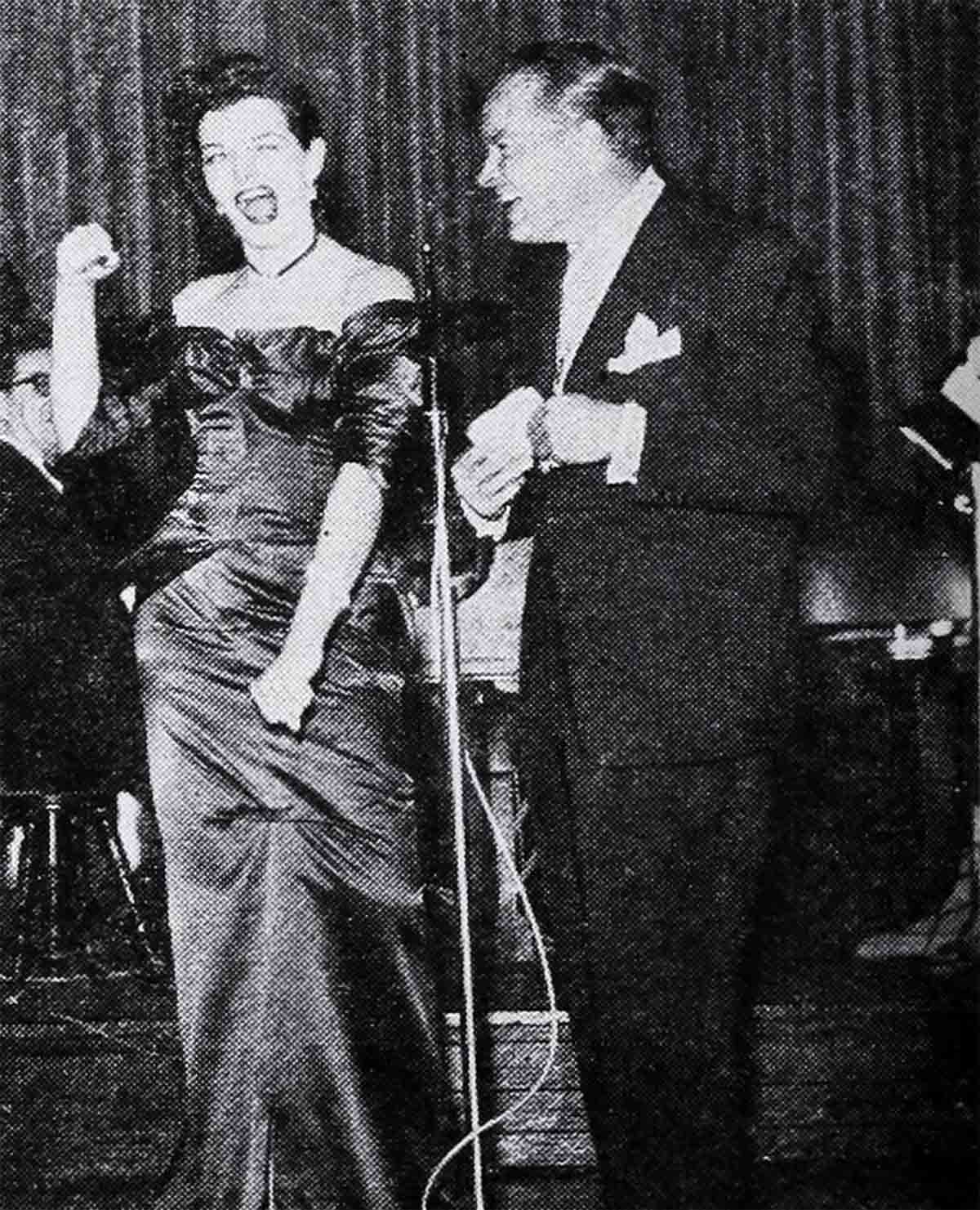
Behind the Film Curtain: June Haver, a wan and pathetic figure since the death of her fiance, Dr. John Duzik, has allied herself almost completely with the Duzik family, as if seeking solace in their company. When June is not visiting them, they are in California with June . . . Ann Sothern said “no” to Cy Howard, writer of “My Friend Irma” who immediately latched on to pretty Cleatus Hutton. Hardly think Ann will change her mind about Cy, either . . . Hollywood foresees a split between Barbara Stanwyck and Bob Taylor just because he falls asleep after dinner. If all the wives in the world divorced husbands who fell asleep after dinner what a broken-up world this would be . . . If the Bogarts ever come to a serious deadlock, it won’t be over a panda or the problem of two careers in a family. It will be because Lauren, who loves Delft ware, wants to paint and refurnish their living room in blue, to blend with her Delft collection and Humphrey thinks he’ll look a sissy in a blue room. Personally, Cal thinks Bogie will look simply lovely in blue. Put down that vase, Bogie, it belongs to Lauren’s collection! Besides, we were only kidding. Honest! . . . In a roomful of handsome men, it was toward manly John Wayne that feminine glances turned more often, Cal noticed. Pretty Mrs. Wayne didn’t seem to mind, except when a determined blonde moved in as if Wayne were her special property. Maybe that’s why Wayne is seen so seldom at Hollywood parties.
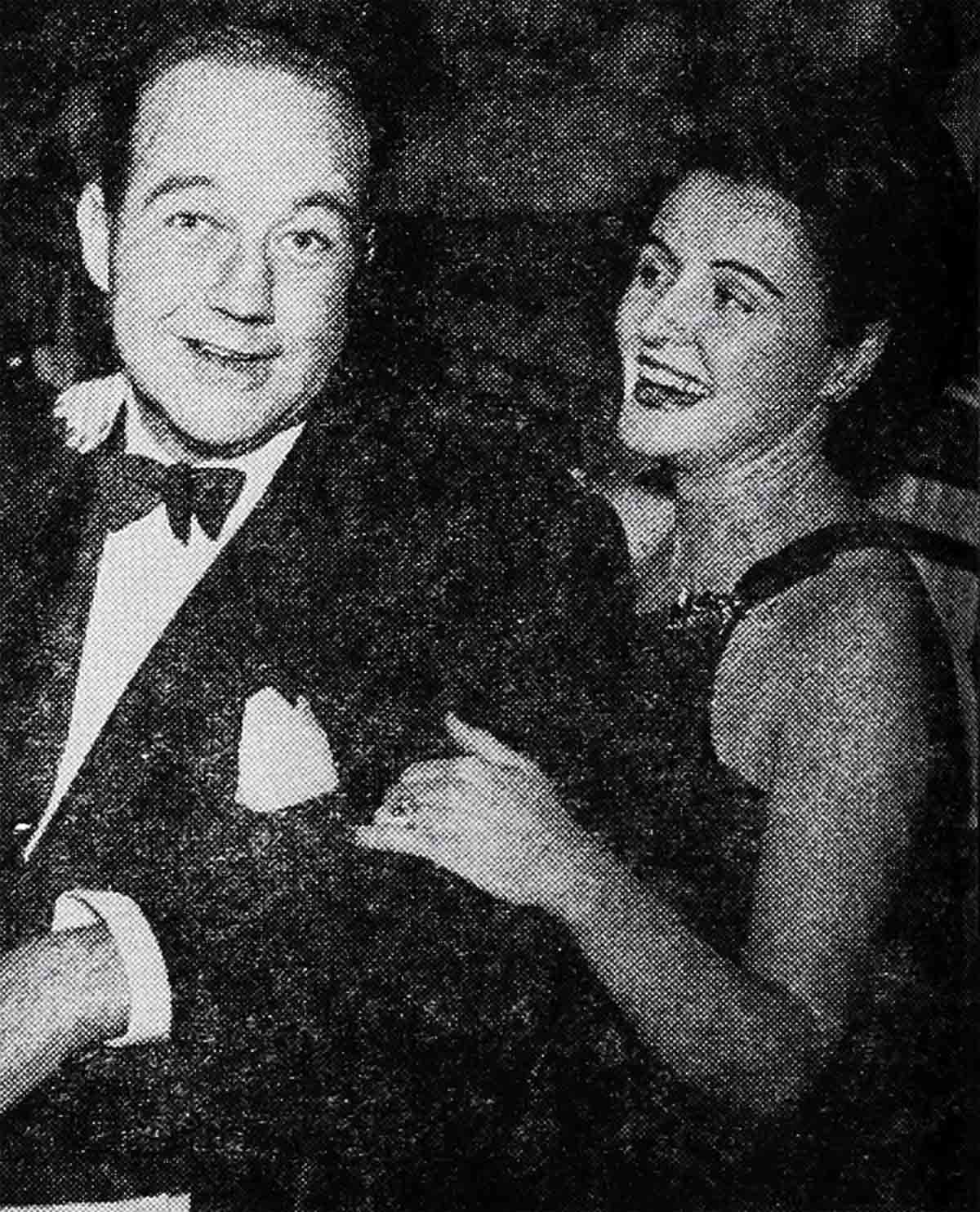
A New Leaf: “I’m not keeping late hours and I’m getting all the rest I can so I can look well when I get to Hollywood,” Lady Ashley told New York friends as she passed through town from London, “I’m even taking the train so I can arrive fresh and rested.” And, except for a few dates with her ardent New York admirer, wealthy Herbie Klotz, she kept her word.
Marriage to Clark Gable, Hollywood’s loneliest bachelor, could have been in the mind of this down-to-earth, forthright Englishwoman and former chorus. girl, exactly the kind of gal Gable likes, but she gave no indication of it.
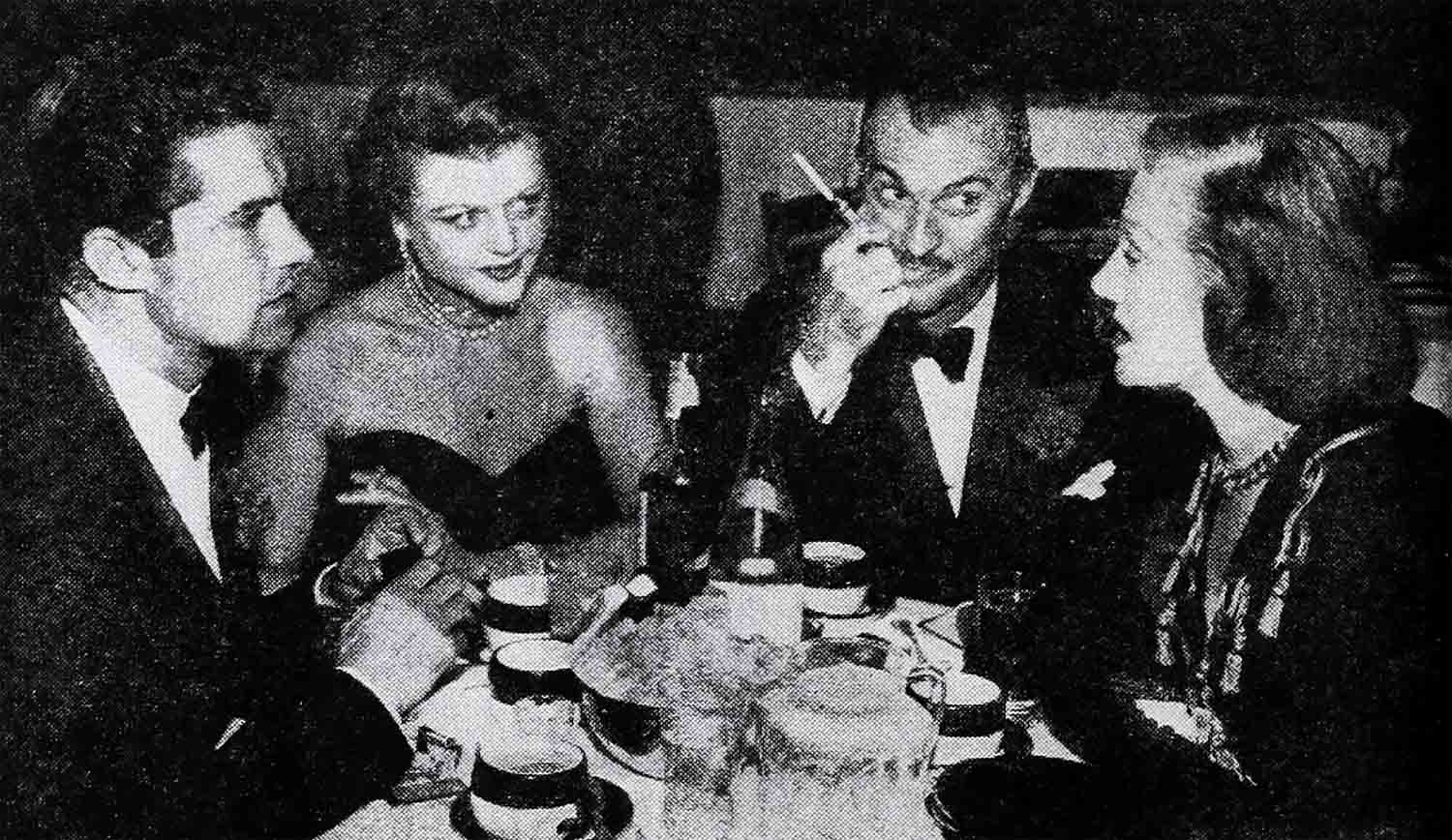
At any rate, those evenings Clark used to tell Cal about, with dinner on a tray in the playroom den while he looked at television, are over. And in Sylvia, who was a devoted wife to Douglas Fairbanks Sr., he has found a woman of the world (and Clark likes his women sophisticated), a woman who can be a perfect hostess in his home and who understands the demands of a movie career and will be content to make her life’s work just being a wife.
“I’ll never marry any of these young gals around town,” Clark once told Cal during a long, confidential chat. “They’re not for me.” And sure enough, he meant it.
So, from Cal our best wishes to the new Mrs. Gable and our heartiest congratulations to our good friend, Gable. We’d say he chose well.
Food for Thought: Everyone has a favorite recipe. Hollywood stars are no exception. Cal’s friends, Dorothy and Maxwell Hamilton, sought out over one hundred of the top film personalities and asked, “What’s cooking?” Needless to say, these amateur chefs came up with some delicious and unusual dishes, all of which were compiled into a different type of recipe book entitled “What Cooks in Hollywood.”
All proceeds go to the Motion Picture Committee of the Disabled American Veterans Service Foundation. You can get a copy by sending $1 to Box 7170, Chicago, Illinois.
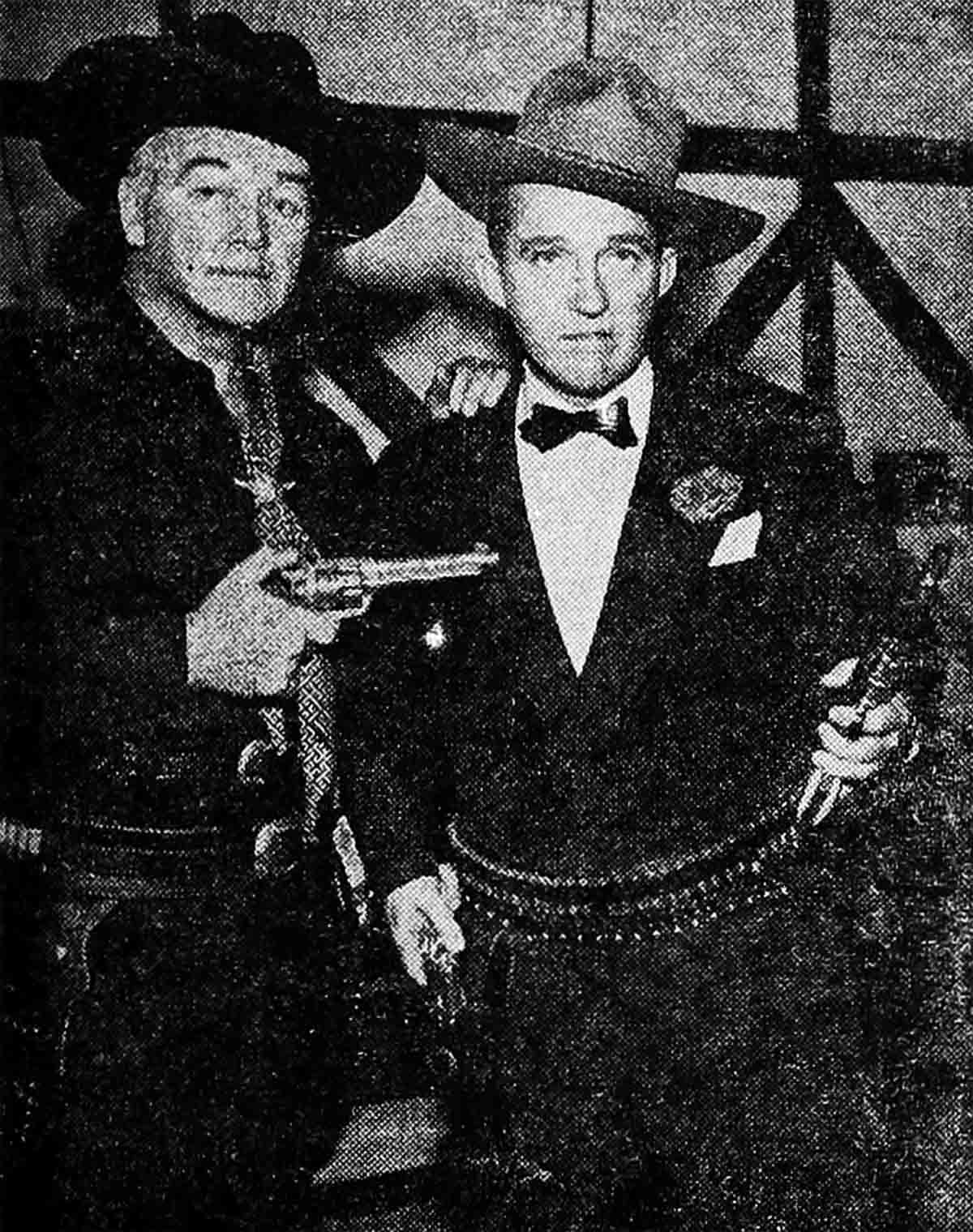
With Trimmings: Gordon MacRae is a young man who seems to have Hollywood’s right number and heaven pray he never gets the wrong one. Anyway, with his characteristic frankness and his gift of humor directed at himself, Gordon tells of his first invitation to a swanky Hollywood party.
The invitation read “black tie” but Gordon, being a Scotsman and only recently coming into good money, had no tux. So, rather than buy one, he received permission to borrow one from Warner’s wardrobe department.
Why not a white coat, he thought to himself. The party was outdoors, so why not be gala?
He even felt gala as he and Mrs. MacRae greeted the ultra-proper hostess who froze for one brief moment in her greeting. Quick glances from guests throughout the evening and the nervous fluttering of the hostess told Gordon something was amiss, but it wasn’t until he stood beneath the glare of a light near the buffet table that he noticed the silver braid that outlined the coat, lapels and all, shining brightly.
“But you must have noticed it when you put it on? How could you miss it?” his friends asked.
Gordon merely shrugged and strolled off, leaving his listeners to believe Gordon was having fun at Hollywood’s expense.
THE END
—BY CAL YORK
It is a quote. PHOTOPLAY MAGAZINE MARCH 1950





No Comments